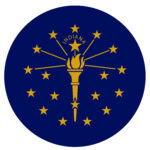
Earlier this month, members of the Indiana General Assembly began a long session year which will run through the end of April. Several bills have been filed which address topics related to protecting water quality throughout the state.
We encourage you to contact your legislators to stress the importance of keeping our water free of harmful chemicals thereby protecting our families, businesses, wildlife, and saving state resources from expensive cleanups.
Here are a list of a few water quality related bills to watch this session. Follow the Hoosier Environmental Council for a full range of environmental issue updates.
Coal Ash Disposal
For decades, Indiana has been producing millions of tons of coal ash each year. Coal ash is the material left after burning coal and contains heavy metals that contaminate water.
Measures to address property coal ash disposal failed in 2022 but will be reintroduced this year via House Bill 1190.
Proper Disposal of Wind and Solar Panel Equipment
With clean energy systems gaining footing in recent years, landowners and operators need to be aware of proper disposal of decommissioned and unused equipment. Electronic waste is often shredded and tossed into landfills where it can release toxic materials into the surrounding environment.
Senate Bill 33 calls for the Indiana Department of Environmental Management and the Indiana Utility Regulatory Commission to conduct a joint study concerning decommissioning and disposal of solar panels and wind power equipment.
Lead Testing at Preschools and Childcare Facilities
House Bill 1138 proposes child care facilities and preschools must test their drinking water before January 1, 2025 to determine if lead is present. The bill also requires these entities to take action if the lead concentration equals or exceeds the action level for lead.
Environmental Scrutiny Before Property Transfer
House Bill 1218 proposes to enact regulations which will help reduce the number of failing septic systems. Property transfers will need to disclose issues with onsite sewage systems or onsite sewage and water wells. Systems must be inspected by qualified professionals and this bill also requires the Indiana State Department of Health to adopt rules to establish qualifications for these inspectors.
Combined Feeding Operation (CFO) Oversight
Large animal feeding operations can contribute nitrogen pollution to our waterways. SB 91 aims to improve oversight of large animal feeding operations (over 300 cattle, 600 swine or sheep, 30,000 fowl, or 500 horses) by changing onsite inspections from every 5 years to every year.
It would require the owner and operator of a CFO to submit annual reports to IDEM concerning their operation and any manure storage structures resulting from the operation.
For more about these bills and others, visit the Indiana General Assembly website at www.iga.in.gov.
